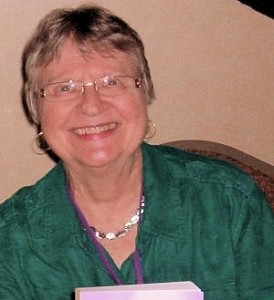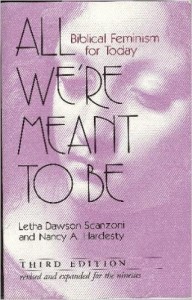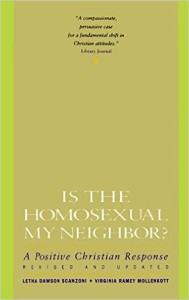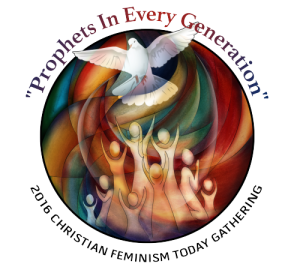Letha Dawson Scanzoni’s Welcome to Christian Feminism Today

 Letha Dawson Scanzoni transformed my life with new revelations. My epiphany came through All We’re Meant to Be, which Letha co-authored with Nancy A. Hardesty, first published in 1974. This was the first book I read that gave biblical support for gender equality in the home, church, and society. All We’re Meant to Be also expanded my images of the Divine to include more than male. As I read All We’re Meant to Be, I discovered more than enough biblical support for the equality of women and men in marriage, in church leadership, and in all areas of life. In addition, this book introduced me to the “radical” notion that God might be more than male. Although Betty Friedan’s The Feminine Mystique had come out in 1963, I’d never heard of the book or raised any questions about women’s traditional roles. The call to gender justice could reach me only through the Bible and interpretations of it.
Letha Dawson Scanzoni transformed my life with new revelations. My epiphany came through All We’re Meant to Be, which Letha co-authored with Nancy A. Hardesty, first published in 1974. This was the first book I read that gave biblical support for gender equality in the home, church, and society. All We’re Meant to Be also expanded my images of the Divine to include more than male. As I read All We’re Meant to Be, I discovered more than enough biblical support for the equality of women and men in marriage, in church leadership, and in all areas of life. In addition, this book introduced me to the “radical” notion that God might be more than male. Although Betty Friedan’s The Feminine Mystique had come out in 1963, I’d never heard of the book or raised any questions about women’s traditional roles. The call to gender justice could reach me only through the Bible and interpretations of it.
 Since then, Letha’s work for LGBTQ justice has also inspired me. Another of her groundbreaking books Is the Homosexual My Neighbor?, co-authored with Virginia Ramey Mollenkott, applies the liberating message of Jesus to justice for LGBTQ persons and has contributed to my pastoral counseling and to my justice advocacy.
Since then, Letha’s work for LGBTQ justice has also inspired me. Another of her groundbreaking books Is the Homosexual My Neighbor?, co-authored with Virginia Ramey Mollenkott, applies the liberating message of Jesus to justice for LGBTQ persons and has contributed to my pastoral counseling and to my justice advocacy.
Letha has also become a supportive colleague and friend. As one of the founders of Evangelical & Ecumenical Women’s Caucus-Christian Feminism Today (EEWC-CFT) and editor of its publications, Letha has invited me to write articles for the organization and to serve on the EEWC-CFT Council. She has challenged me to grow as a writer and justice activist.
Letha’s letter that I include below is printed in the program of the recent Christian Feminism Today Gathering and published in Christian Feminism Today. Her letter gives not only a welcome to the Christian Feminism Today Gathering, but also a concise history of the organization and a compelling invitation to join our ongoing work.
“Welcome to the 2016 Gathering of the Evangelical & Ecumenical Women’s Caucus-Christian Feminism Today! We’re so glad you’re here—whether you’re attending for the first time or back again after many times.
Some of you weren’t yet born when our organization formed in 1974. You may wonder what to expect from a group that began so long ago. Others, remembering a time when most people considered the words “Christian” and “feminism” incompatible, may wonder what this organization has to say to today’s changing world. Have we kept up so that we can speak to the challenges of 2016 and beyond?
Some of you may be concerned about the word “evangelical”— part of our official name. It meant “good news” when the Evangelical Women’s Caucus (EWC) was incorporated but has now become a victim of identity theft by the religious right, which has appropriated it as a political tool for promoting “bad news” for women, LGBTQ people, immigrants and refugees, poor people, people of color, and the earth itself as our planet suffers the effects of climate change.
Twenty-six years ago, at one of our biennial conferences, I presented a plenary address titled “Back to the Future: Forward to the Dream.” At that 1990 gathering in Chicago, we would be voting on whether to add another “E” to our name, changing it from the “Evangelical Women’s Caucus” (EWC) to the “Evangelical and Ecumenical Women’s Caucus” (EEWC) to reflect the greater religious diversity of our membership. (Currently, we often use the organization’s “doing business as” name, Christian Feminism Today, or EEWC-CFT.)
But leading up to that 1990 conference was the concern of some people that our organization was changing too fast from its original vision of women’s equality in the home, church, and society—that we were getting involved in too many additional justice causes and driving other Christians away. The most controversial of these justice concerns had been our 1986 resolution supporting civil rights for homosexual persons. We had lost many members over that resolution, particularly because we acknowledged that our membership included a small number of lesbians. Such opposition to our standing up for fairness and justice seems so absurd now. But there were serious consequences, making us outcasts in some Christian circles.
And so, in my 1990 speech, as our organization was acknowledging our expanding vision once again by adding another “E” to our name, I pointed out that since we seemed to show a penchant for the letter “E,” I would “use alliteration to compose a variation on an ‘E’ theme.” It would show that EWC’s vision has always been one of equality, empathy, education, empowerment, and expansiveness.” And it is this same constellation of five “E’s” that I want to share as we think about another “E,” expectations.
Expectations: What we hope you’ll experience at this 2016 gathering
Equality. You can expect an emphasis on equality here because we’re convinced that roles and responsibilities in the church or any other religious body should not be assigned according to gender but based on the gifts and calling the Spirit has given to individuals. We’re also called to practice a spirit of equal respect and mutuality in all our human relationships, which we trust you’ll sense here. We strive to follow what Jesus said about not lording it over others or judging anyone, remembering we’re all siblings together in the family of God. We want this gathering to be a safe place where you can feel at ease.
Empathy. Many of you have come to this gathering with heavy hearts, longing for someone to listen and understand. You may be experiencing physical or emotional pain. Maybe you’re grieving someone you loved. You may be facing financial distress. Perhaps you’re trying to decide what to do about a relationship that appears to be ending or has turned abusive. Maybe your children are facing difficulties, or you have decisions to make about aging parents. Perhaps you’ve lost your job and aren’t sure where to turn next. You may be struggling with personal issues of faith, or sexual orientation, or career choice. Maybe you’re lonely. We trust you’ll feel accepted here just as you are, knowing you’re loved by people who care and empathize. EEWC-CFT is a place where deep friendships are formed, many of them lasting a lifetime. We’re also a group that prays for each other and keeps in touch through a group email list.
Education. We like to learn and aren’t afraid to ask questions and even express doubts, so you can expect to find your mind stimulated by what you learn at this conference. We’ve been a studious bunch from the beginning, caring about serious scholarship in biblical studies, theology, hermeneutics, and other areas of the humanities, as well as the social, behavioral, and physical sciences. We believe in integrating our faith and our intellect, loving God with both heart and mind. That’s why we feature workshops and speakers who stretch our minds as well as warm our hearts. We’re exposed to new ways of thinking about the Bible, the world, and God, including biblically-based new names and images for the Divine, reminding us that God is beyond gender classifications and that referring to our Creator as She is just as biblical as the traditional He. And in view of new understandings of gender fluidity and a gender continuum, we may gain new language and understandings about each other as well. Learning is empowering.
Empowerment. From its beginning, this organization has stressed empowerment. We’ve encouraged each other to be all we’re meant to be, not held back by assigned roles, assumptions, attitudes, and actions of a patriarchal system that limits and restricts. We hope this gathering will help you feel empowered to find your voice and use it, unafraid to be assertive, to confront bigotry, to stand up against discrimination, and to channel your anger against injustice by working for change.
Expansiveness. This final “E” word is not primarily about numerical growth, although we do want our message to reach as many people as possible and hope to see EEWC-CFT grow. But it’s also about not letting our minds and hearts shrivel into complacency but rather opening them ever wider to a broadening vision of the Holy One and the work She has entrusted to us.
So we hope each of you will approach this gathering expectantly, enjoy your experience enormously, and leave here energized!”
Letha’s Welcome Letter, originally published in Christian Feminism Today. Reposted with permission.
